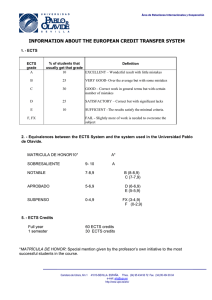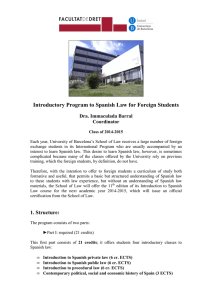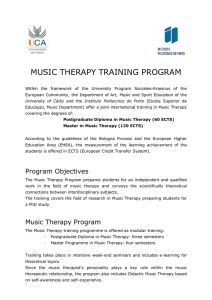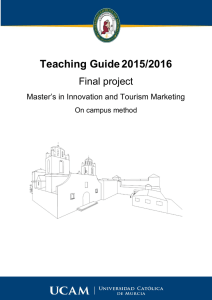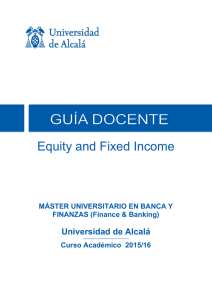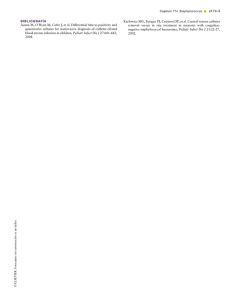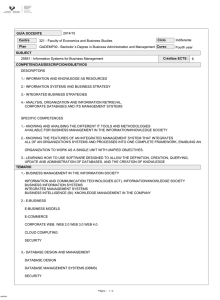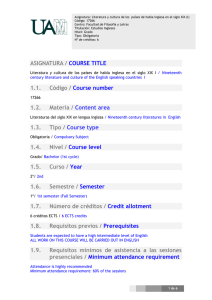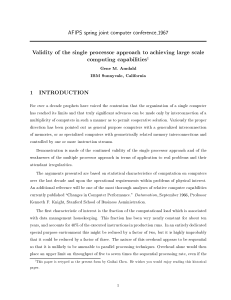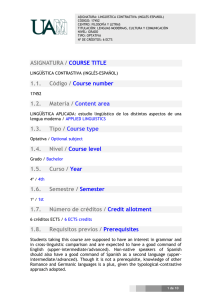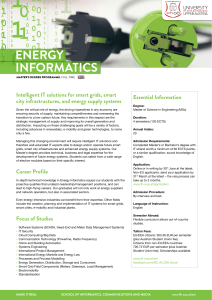Ingles medieval
Anuncio
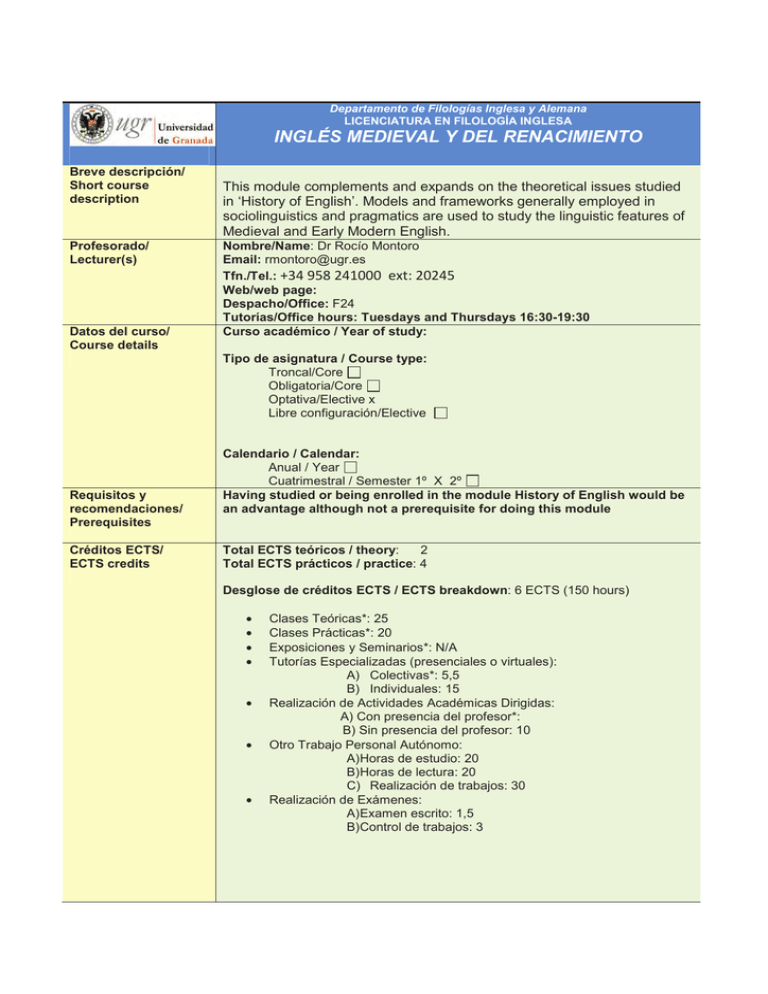
Departamento de Filologías Inglesa y Alemana LICENCIATURA EN FILOLOGÍA INGLESA INGLÉS MEDIEVAL Y DEL RENACIMIENTO Breve descripción/ Short course description Profesorado/ Lecturer(s) Datos del curso/ Course details This module complements and expands on the theoretical issues studied in ‘History of English’. Models and frameworks generally employed in sociolinguistics and pragmatics are used to study the linguistic features of Medieval and Early Modern English. Nombre/Name: Dr Rocío Montoro Email: rmontoro@ugr.es Tfn./Tel.: нϯϰϵϱϴϮϰϭϬϬϬĞdžƚ͗ϮϬϮϰϱ Web/web page: Despacho/Office: F24 Tutorías/Office hours: Tuesdays and Thursdays 16:30-19:30 Curso académico / Year of study: Tipo de asignatura / Course type: Troncal/Core Obligatoria/Core Optativa/Elective x Libre configuración/Elective Requisitos y recomendaciones/ Prerequisites Créditos ECTS/ ECTS credits Calendario / Calendar: Anual / Year Cuatrimestral / Semester 1º X 2º Having studied or being enrolled in the module History of English would be an advantage although not a prerequisite for doing this module Total ECTS teóricos / theory: 2 Total ECTS prácticos / practice: 4 Desglose de créditos ECTS / ECTS breakdown: 6 ECTS (150 hours) • • • • • • • Clases Teóricas*: 25 Clases Prácticas*: 20 Exposiciones y Seminarios*: N/A Tutorías Especializadas (presenciales o virtuales): A) Colectivas*: 5,5 B) Individuales: 15 Realización de Actividades Académicas Dirigidas: A) Con presencia del profesor*: B) Sin presencia del profesor: 10 Otro Trabajo Personal Autónomo: A)Horas de estudio: 20 B)Horas de lectura: 20 C) Realización de trabajos: 30 Realización de Exámenes: A)Examen escrito: 1,5 B)Control de trabajos: 3 Descriptores/ Course keywords Objetivos / Objectives of the course Contenidos/ Syllabus Métodos docentes/ Teaching methods Sociolinguistic and pragmatic approaches to the study of Medieval and Early Modern English This module looks at the linguistic features of Middle English and Early Modern English from a, primarily, practical perspective. Students will be equipped with tools borrowed from Sociolinguistics and Pragmatics so that texts from the selected periods can be analysed, commented on and discussed. Students’ reading on the various subjects, as well as active participation in class, are essential components of the module. Students will be expected to use SWAD to submit work, post comments, communicate with their tutor, etc. 1. The M.E. period: Introduction and sociolinguistic approaches 2. Middle English variation and Chaucer 3. Late Middle English period: Sociolinguistic changes and Chancery English 4. The Early Modern English period: Introduction 5. Early Modern English variations: Shakespeare and pragmatic approaches. 6. Towards a standardisation of English: Gender variations. Combination of lectures and seminars Evaluación/ Assessment Students are expected to attend lectures and to actively contribute in seminar discussions. Assessment is based on the submission of two essays (30% each) and a final exam (40%). Essay titles, seminar handouts and any extra material will be uploaded in SWAD. Idioma usado en clase y exámenes/ Language of instruction Bibliografía y recursos/ Recommended reading English Bibliografía Obligatoria / Compulsory Reading McIntyre, D. (2008) History of English: A Resource Book for Students. London: Routledge (handouts will be provided; no need to purchase the book) Bibliografía Básica / Recommended reading Freeborn, D. (2006) From Old English to Standard English. A Coursebook in Language Variation across Time. 3rd edition. Houndmills, Basingstoke: Palgrave Leith, D. (1997) (2nd ed.) A Social History of English. London and New York: Routledge Bibliografía Adicional / Further reading Baugh, A. C. and Cable, T. (2005) A History of the English Language. 5th edition. London and New York: Routledge Fennell, B.A. (2001) A History of English. A Sociolinguistic Approach. Oxford: Blackwell Fitzmaurice, S. M. and Taavitsainen, I. (eds)(2007). Methods in Historical Pragmatics. Berlin, New York: Mouton de Gruyter. Otros recursos / Other resources Further information and links will be provided in class and SWAD
